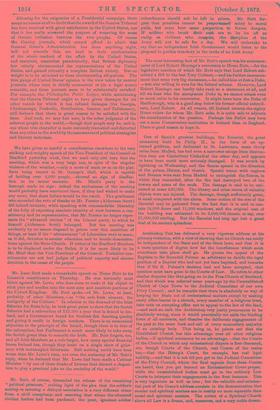Archbishop Tait has delivered a very vigorous address at hie
primary visitation, with a view of showing that no Church can really- be independent of the State and of the State laws, and that it is- a mere question of degree how far the interference which must sometimes take place shall go. He quotes the appeal of the Baptists to Sir Roundel Palmer as arbitrator to decide the legal position of a Baptist who had not yet been baptised, and remarks that if Sir R. Palmer's decision had not been accepted, that question must have gone to the Courta of-Law. He refers to other similar disputes like that going on in the Free Church of Scotland, and that which was referred some years ago by the Unestablished Church of Cape Town to the Judicial Committee of our own Privy Council ; and he remarks that there is absolutely no way of keeping the State out of ecclesiastical matters except by making every office-bearer in a church, every member of a religious trust, take oath on accepting office not to appeal to the law of the land, —and such an oath the Archbishop very justly pronounces to be absolutely wrong, since it would practically set aside the binding force of all contracts, and dissolve the deliberate engagements of the past at the mere beck and call of every momentary majority of an existing body. This being so, he points out that the Established Church has this advantage over all other religious bodies,—if spiritual autonomy be an advantage,—that the Courts of the Church in which any ecclesiastical dispute is first discussed, are, though Courts of the Church, real Courts of the realm too,—that the Bishop's Court, for example, has real legal validity,—and that it is not till you get to the Judicial Committee of the Privy Council, where the final appeals from these Courts are heard, that you get beyond an Ecclesiastical Court proper, while the uneetablished bodies must go to the ordinary Law Courts to interpret their engagements in the first instance. This is very ingenious as well as true ; but the valuable and substan- tial part of his Grace's address consists in the demonstration that secular and spiritual matters are in reality no more separable than moral and spiritual matters. The notion of a Spiritual Church above all Law is a dream, and, moreover, not a very noble dream.


































 Previous page
Previous page